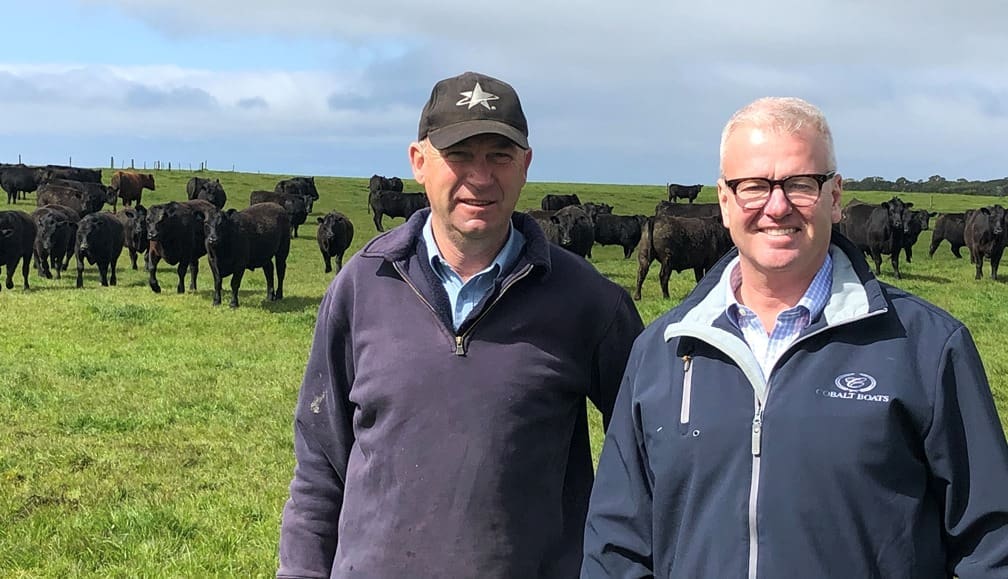
KI beef producer Robert Skipworth and JBS Southern chief, Sam McConnell with bullocks destined for the KI branded beef program
AUSTRALIA’S largest red meat processor plans to launch a paddock-to-primals traceability system for one of its signature beef brands before year’s end.
The project will link individual beef producers back in the paddock with consumers and end-customers in a way not previously seen at any significant scale in the Australian beef industry.
The project was announced on Monday at a special JBS field-day function on King Island where cattle suppliers, distributors and restaurant end-users engaged with the highly-regarded King Island beef brand were bought together to meet face-to-face for the first time.
JBS Australia’s Southern chief operations officer, Sam McConnell, said the scheme would be the first of its kind on any significant scale, linking individual beef producers with consumers at retail and food service/restaurant level.
“It has been 12 months in the making and will be part of a larger blockchain scheme being implemented by JBS that will enable individual primal cuts to be traced back to the grower,” Mr McConnell said.
Initially, the program will be implemented into the company’s Longford beef plant in Tasmania where cattle supplied by its King Island growers are processed.
“We are very excited about this innovation,” Mr McConnell said. “And as the system evolves, it will be rolled out at our Brooklyn plant in Melbourne.”
Ultimately the blockchain-driven traceability system could be used more widely across JBS Australia’s branded beef operations, Beef Central was told.
Mr McConnell told the audience of about 60 cattle producers, wholesale distributors, retailers and restaurateurs that recent advances in technology had made the implementation of the traceability program possible.
And, although exact details of the program were proprietary, the basic functionality of the scheme was being made possible by blockchain and the use of computer-aided video surveillance.
Consumer buying patterns, Mr McConnell said, were changing, and it was important that the red meat industry moved with those trends.
“People are using different methods to shop… utilising the internet and the likes of Uber Eats to purchase their food requirements, and as an industry we must be ready to become part of that change.”
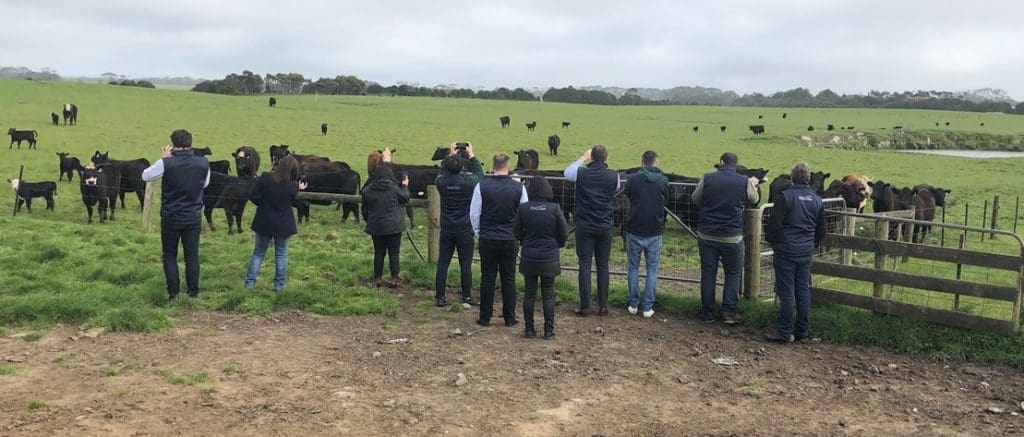
Restaurateurs from Hobart to Darwin met face to face with KI beef producers to receive the news JBS will implement a traceability scheme that will link primal cut back to the grower.
JBS Southern manager of retail marketing, Rob Ryan, told the gathering that the implementation of the new traceability scheme had allowed the company to refresh and reposition the King Island beef brand.
“This has also been in the pipeline for the past 12 months,” Mr Ryan said.
“We have re-designed packaging and printed promotional material about the product which will be available in selected flagship restaurants, partnering with JBS, located around Australia,” he said.
“It will enable the end-user to tell the story of each individual grower providing the product, as these primal cuts are being bought and served to their consumers in their restaurants.”
“It is an innovation that parts of the market have increasingly demanded for some time, but no-one as yet has been able to deliver – certainly at any real scale.”
He said a lot of operational adjustments and changes had had to be made behind the scenes to make the traceability project work.
“We’ve had to spend a lot of time linking the physical operations in the plant with the technology and data capture. As each carcase is broken down into its component parts, it gets increasingly challenging to preserve identity, at an individual cuts level, in a large abattoir. Video imaging is just part of that process, but there’s a suite of integrated systems involved, and every plant is different in the way it operates.”
Mr Ryan was grateful for the large number of restaurateurs and distributors who had made the journey down to King Island to meet the farmers who grow the King Island beef, and understand the new traceability process.
“It is very rare we have these face-to-face meetings between the grower and the end-users. And, King Island being the unique location that it is, makes it especially pleasing for JBS to arrange this function in the farmers back yards,” he said.
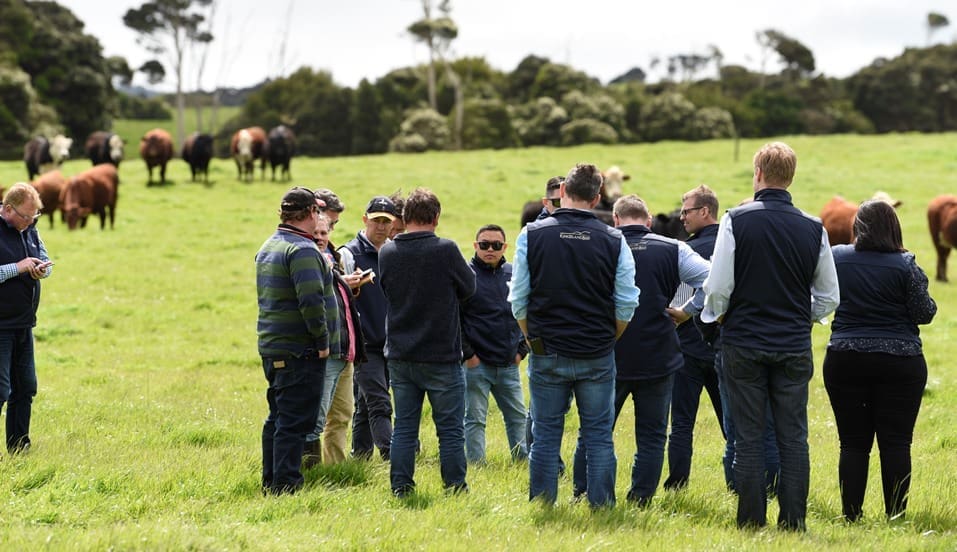
Restaurant chefs from across Australia interacted with cattle producers during Monday’s JBS King Island field day

Third generation King Islander, Fred Perry said working with weather and nature assists his family to turn off up to 600 steers annually into the King Island Beef program.
Refinements over time
As one of Australia’s pioneer beef brands, King Island had undergone a series of refinements over the past decade, to ‘tick more and more consumer boxes,’ JBS Southern’s Rob Ryan said.
“It started off simply carrying the King Island identity, as the source, then it embraced MSA, and later still the JBS Farm Assurance scheme,” he said.
“As time has gone on, more and more elements have been added to the King Island brand story, and individual cuts traceability back to farm of origin is the latest of those. Along the way, the eating quality spec behind the product has increasingly tightened over time.”
“Now that we have ticked all those other boxes, the most common thing we get asked by customers around the world is which farm did this product come from?” Mr Ryan said.
“This massive innovation, which we’ve been working on at JBS for some considerable time, allows us to do that, ticking the final box that nobody else has solved.”
“To top off the list of brand attributes with this full traceability is a massive achievement, and it’s hard to describe in words how much effort has gone into this, from so many stakeholders, to make it all happen.”
“This process opens up so many opportunities now to close the big gap that exists between the producer and the end consumer – and the ability to create further interaction through apps, Youtube and other social media, and other technologies, to drive this through the chain.”
“We see this traceability process as delivering huge benefits for us (JBS), as well as our producers. Ultimately this is going to turn into dollars and cents for the producer. For an individual producer participating in a large-scale brand like King Island or Great Southern, their face, for the first time, becomes a key part of the brand story and its provenance.”
Mr Ryan said traceability could be pursued for many different reasons.
“The process we have put in place has two main purposes. One is to underpin the integrity of the product and have the linkage to ensure that what is being sold is indeed King Island beef. The second, and perhaps more importantly from a marketing perspective, is closing the gap, to a final degree, between the consumer and the producer.”
Supply chain participant reaction:
One of King Island’s largest beef producers, TRT Pastoral Group’s Tim Roberts Thomson, who farms about 15,000 beef units both on KI and in north east Victoria was excited about JBS Southern’s planned expansion into its traceability program.
“I think it’s long overdue,” Mr Roberts-Thomson told Beef Central.
“As a producer, I believe for too long beef’s high-quality primal cuts have been treated as commodity product once the animal body has progressed beyond the slaughter floor.
“Beyond that point, the individual grower has not got due recognition for the quality of their inputs, in the animal breeding, feeding and management, and a system such as this can deliver the reward and recognition back to the individual producer.”
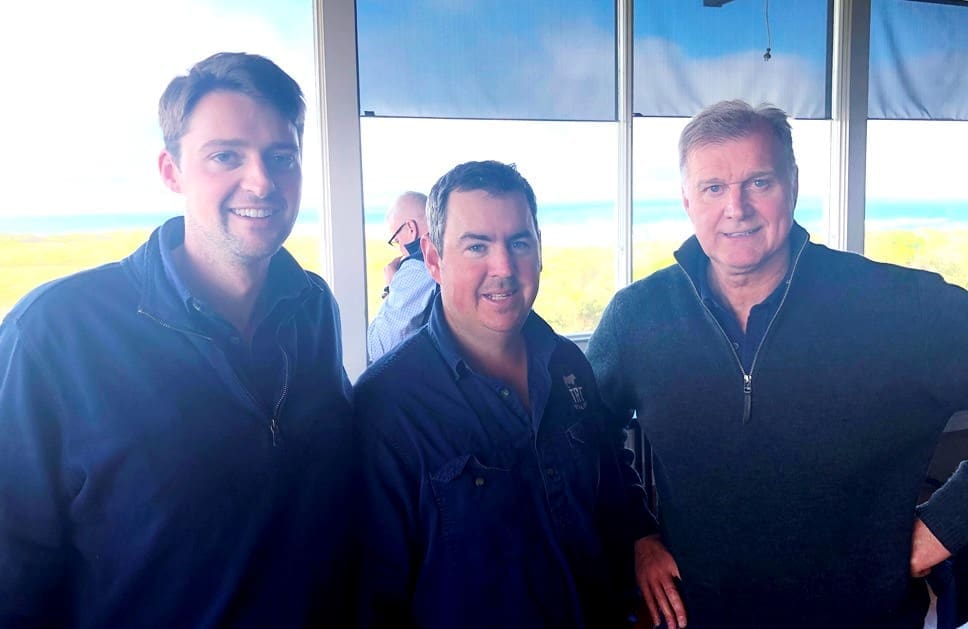
TRT Pastoral Group’s James and Nick Roberts-Thompson and its KI operation manager, Cody Whiteman were enthusiastic about the the paddock to primal traceability program planned for the King Island beef brand.
Executive chef with Darwin’s Mindil Beach Casino Resort, Athol Wark, was equally enthusiastic about the King Island brand’s paddock-to-plate traceability program.
“I think it’s great. The food industry is already doing it (traceability) with the oysters and wines we serve, and the general public are now requesting the same provenance information about their red meat… wanting to know where it has come from and where it has been processed.”
“From our prospective in our restaurant, it’s about establishing the front-of-house connection and communication with the customer. And, the more information we have about the product helps build the brand story, and can be delivered with the dish, which is what we current do… telling the story of the dish whether it is oysters, seafood, meats or the wine.”
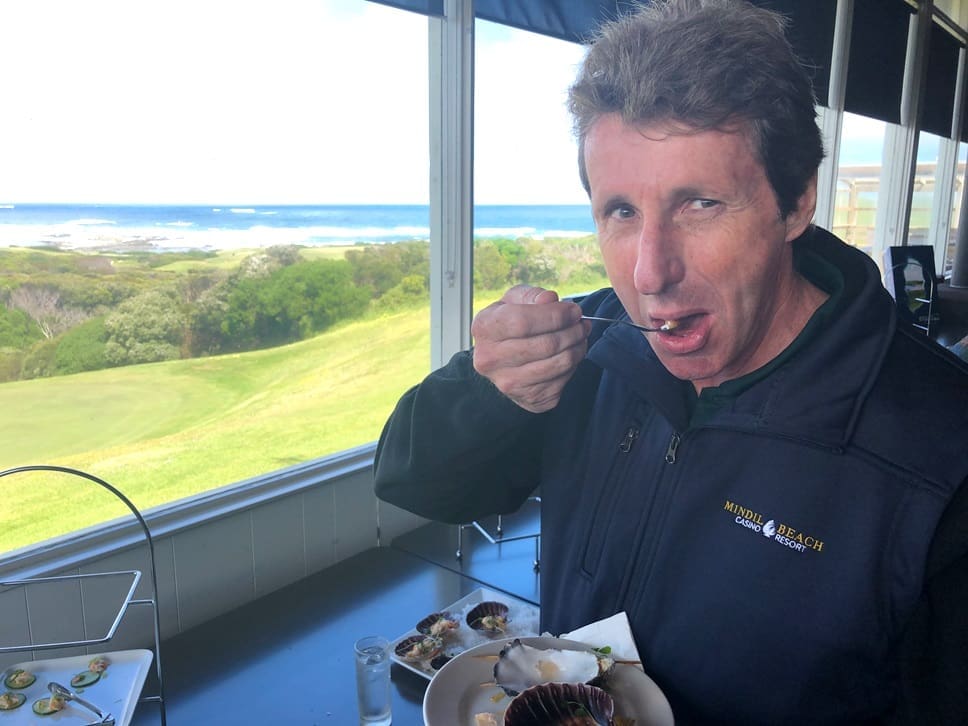
Mindil Beach Casino Resort executive chef Athol Wark made the trip from Darwin to met King Island beef producers
“It’s definitely a cool idea, because we have now visited the farms where the beef has been grown, and we can talk to our customers about it,” said Francesco Mannelli, head chef at Sydney’s Four Seasons Mode Kitchen & Bar.
“Ï think it’s important that we will now be able to talk to our clients about the individual farmers who breed and grow the beef we are offering today, and the environment in which the cattle were raised. And as chefs, when you are happy with the product, you want to know about its reliability, its consistency in supply and quality to your restaurant.”
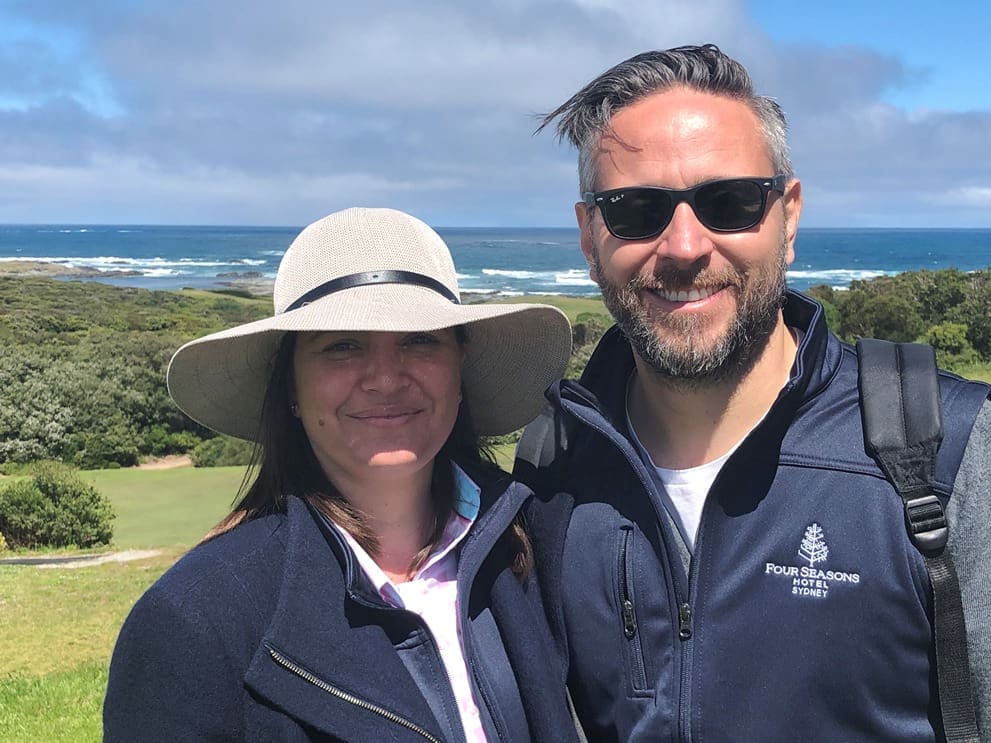
Andrews Meats general manager food services, Jacinta Geddes and Mode Kitchen & Bar, Sydney, head chef Francesco Mannelli went on-farm to met King Island beef producers
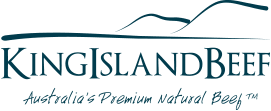 King Island is one of five JBS brands operating under the Great Southern ‘family’ of farm-assured beef brands. Others include Pinnacle (marbling score 2+) , Little Joe (MS4+), Hereford Boss and Great Southern.
King Island is one of five JBS brands operating under the Great Southern ‘family’ of farm-assured beef brands. Others include Pinnacle (marbling score 2+) , Little Joe (MS4+), Hereford Boss and Great Southern.
